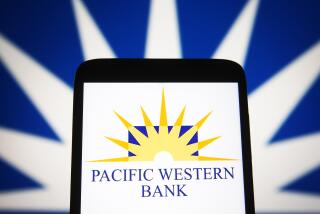Security Pacific Looks to Help in UAL Buyout : Airlines: A coalition of banks is attempting to arrange financing for an employee takeover. Rising fuel prices cloud the picture.
- Share via
Security Pacific National Bank confirmed Tuesday that it has joined a group of banks searching for financing for the proposed $4.38-billion employee buyout of UAL Corp., parent of United Airlines.
But the buyout faces an uncertain future given rising fuel prices, which would add several million dollars to the annual cost of operating the nation’s second-largest airline. The board of Chicago-based UAL will meet today amid speculation that the union-led buyout group will be forced to ask for an extension of its Thursday financing deadline.
UAL’s stock fell $9.75 a share Tuesday to close at $101 a share on the New York Stock Exchange. On July 27, the stock closed at $163.
“Our guys continue to work on the deal,” said Steven Matthews, a spokesman in New York for the employee group. “No extension has been requested.”
The group, headed by former Chrysler Vice Chairman Gerald Greenwald, has been pressuring aircraft and engine manufacturers to invest in the buyout. The failure to find an equity partner has caused three defections from a five-bank group that had informally agreed several weeks ago to arrange about $4 billion in bank financing.
However, Chemical Banking Corp., Citicorp and Chase Manhattan are reported to be interested in rejoining Bankers Trust New York and Manufacturers Hanover if an equity investor materializes.
Security Pacific spokeswoman Penny Maines said the Los Angeles-based bank is “involved in discussions with the buyout group and Bankers Trust and Manufacturers Hanover, and we are continuing to work on the transaction.” Maines declined to say whether Security Pacific had agreed to lend $500 million to the effort as each of the original five banks had tentatively agreed to do.
“It could well be too little, too late, particularly in light of what our friends in the Middle East are doing,” said Scott Hamilton, an editor of Commercial Aviation Report, an airline financing newsletter. “The banks were hardly enthusiastic about this deal a week ago and now . . . an iffy deal becomes even worse.”
More to Read
Inside the business of entertainment
The Wide Shot brings you news, analysis and insights on everything from streaming wars to production — and what it all means for the future.
You may occasionally receive promotional content from the Los Angeles Times.










